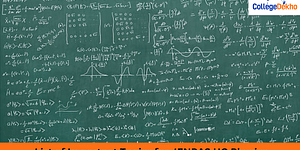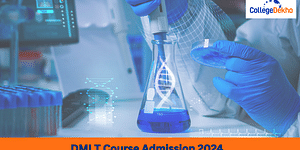BSc Perfusion Technology
BSc Perfusion Technology
Bachelor of Science in Perfusion Technology (BSc Perfusion Technology) is an undergraduate degree that deals with the study of pathology, physiology and equipment used to create a support system for the heart or lungs during a medical procedure. Perfusion Technology mandates students to have a thorough understanding of respiratory or circulatory systems and be able to operate complex technologies.
Admission to BSc Perfusion Technology is based on an entrance test or merit. Aspirants must have completed 12th standard in the Science stream with Physics, Chemistry and Biology as their subjects. They are also required to have at least 50%-55% marks to be eligible to apply to colleges for admission. Some of the popular entrance exams that students can choose to take are AIIMS, AICET, BVP CET, CUCET and JIPMER.
The top colleges to pursue BSc Perfusion Technology are Christian College Bangalore, DY Patil University, SRM University, Armed Forces Medical College, R.G.Kar Medical College and Hospital. The career scope of BSc Perfusion Technology is constantly expanding with opportunities to work at various medical organisations in different junior and senior job profiles such as junior perfusionist, senior perfusionist, cardiac perfusionist, perfusion technician and etc. All of these roles can offer one an annual salary of INR 3,00,000 to INR 20,00,000.
Table of Contents
- BSc Perfusion Technology
- BSc Perfusion Technology Course Highlights
- Why Choose BSc Perfusion Technology?
- Roles and Responsibilities of BSc Perfusion Technology Graduates
- BSc Perfusion Technology Entrance Exams
- BSc Perfusion Technology Eligibility Criteria
- Documents Required for BSc Perfusion Technology Admission Process
- How to Get Admission to BSc Perfusion Technology Courses?
- Popular BSc Perfusion Technology Colleges in India
- City-Wise Top Colleges for BSc Perfusion Technology in India
- What is BSc Perfusion Technology Course Fee?
- BSc Perfusion Technology Core Subjects
- BSc Perfusion Technology Syllabus
- Curriculum of BSc Perfusion Technology
- BSc Perfusion Technology Scope in India - Career and Job Prospects
- What is Salary after BSc Perfusion Technology?
- Top Recruiters for BSc Perfusion Technology Jobs
- Required Skills to Become a Good Perfusionist
- FAQs about BSc Perfusion Technology
BSc Perfusion Technology Course Highlights
Students can refer to the brief overview of BSc Perfusion Technology in the table below:
Name of the Course |
BSc Perfusion Technology |
|---|---|
|
Full Form |
Bachelor of Science Perfusion Technology |
|
Stream |
Medical |
|
Degree Level |
Undergraduate |
|
Course Mode |
Full-time |
|
Course Duration |
3 years |
|
Qualification Required |
Completed Higher Secondary with at least 50% aggregate marks |
|
Exam Type |
Semester system |
|
Admission Process |
Entrance-based or merit-based admission |
|
Annual Fees Range |
INR 10,000-INR 1,25,000 |
|
Career Prospects |
Perfusionist, Cardiac Perfusionist, Lecturer, Patient Care Coordinator, Medical Equipment Sales Representatives |
Why Choose BSc Perfusion Technology?
Students of BSc Perfusion Technology work mostly during open-heart surgeries, although their role also extends to areas such as congenital heart defects, treatment of other heart diseases and emergency cases. One should choose the course based on the given parameters:
- There is high demand for perfusion technologists in both India and abroad. The demand is higher than the supply and therefore one is assured to get a secured job after completion of the course.
- Graduates can help in saving the lives of patients during critical surgical procedures.
- One will also get to assist the surgeons and get experience and skills related to their job role.
- The average salary package is lucrative as they are entrusted with a job of high responsibility.
- Practitioners get high satisfaction and contentment when they witness the success of surgeries.
BSc Perfusion Technology Upcoming Trends
The entire structure of the medical industry is changing in India over the past few years. With the advancement in the medical field, the demand for medical professionals is increasing every year throughout the country. Now a days, in order to properly run any medical establishment, a lot of professional graduates from diverse medical field is necessary. That is why, demand for these professionals is also witnessing a steep rise in the graph. Professional graduates of BSc Perfusion Technology have a huge potential and career as their demand is increasing and also, their job roles include high compensation with other additional benefits.
Roles and Responsibilities of BSc Perfusion Technology Graduates
BSc in Perfusion Technology graduates have to fulfil the following roles and responsibilities in their work field:
- Study the patients' medical history and prepare suitable notes for surgery.
- Operate and select a variety of extracorporeal circular equipment such as heart-lungs machines, blood transfusion devices, artificial hearts, intra-aortic balloon pumps and ventricular assistance devices.
- Ensure the safety of patients during surgery.
- Monitor and care management of patients.
- Administration of blood production and medications during surgery.
- Administrative duties such as equipment management, supply purchasing, quality improvement and department management.
BSc Perfusion Technology Entrance Exams
Most universities conduct entrance tests for admitting students to BSc Perfusion Technology in India. Here, one’s high school results also play an important role. The following are some of the entrance exams that are conducted in India:
Entrance Exam |
Full Form |
|---|---|
|
AIIMS Exam |
All India Institute of Medical Sciences Exam |
|
JIPMER Entrance Exam |
Jawaharlal Institute of Postgraduate Medical Education & Research Entrance Exam |
|
CUCET |
Chandigarh University Common Entrance Test |
|
NIIMSEE |
NIIMS University Entrance Exam |
|
JET |
Jain Entrance Test |
|
BHU UET |
Banaras Hindu University Entrance Exam |
|
SUAT |
Sharda University Admission Test |
|
AICET |
All India Common Entrance Test |
|
BVP CET |
Bharati Vidyapeeth Common Entrance Test |
Note: Admission to BSc Perfusion Technology will be based on the scores obtained by candidates in the entrance exam. The colleges may take additional interviews and conduct group discussions to select students.
BSc Perfusion Technology Eligibility Criteria
The admission requirements in all the universities in India for BSc Perfusion Technology courses are not the same all over India. However, there are some common eligibility criteria or entry requirements that applicants must fulfil to grab a seat at their desired university:
- Students must be at least 17 years old.
- They must have completed 10+2 from a recognised board.
- They must have at least 50%-55% aggregate marks in higher secondary.
- They should have Physics, Chemistry, Biology and English as subjects.
- They need to qualify for the entrance test and clear the cut-off score.
Note: Students should also meet the university-specific admission criteria.
Documents Required for BSc Perfusion Technology Admission Process
It is mandatory to submit some specified documents as requested by the university to complete the admission process for BSc Perfusion Technology. Here is a list of the same:
- Marksheet and pass certificate of class X and XII,
- Date of birth proof,
- School leaving certificate,
- Transfer certificate,
- Character certificate,
- Reservation certificate for SC/ST/OBC candidates,
- Disability certificate for physically disabled students.
How to Get Admission to BSc Perfusion Technology Courses?
Aspirants of BSc Perfusion Technology must be aware of the particulars of admissions to the courses. Given below are the general admission rules:
- Step 1: Select and make a list of colleges offering BSc Perfusion Technology courses.
- Step 2: Visit the official website of the colleges and fill up the application form.
- Step 3: Submit all the documents.
- Step 4: Appear for the entrance examination.
- Step 5: Check the name in the merit list.
- Step 6: Participate in personal interviews or group discussions if the college requires it.
- Step 7: Complete the application by paying the tuition as well as other fees as mentioned.
Note: There may be additional steps for admission as per the university’s requirements.
Popular BSc Perfusion Technology Colleges in India
Here is a comprehensive list of the popular colleges in India that provide students with opportunities to pursue BSc Perfusion Technology:
College |
Location |
|---|---|
|
Aarupadai Veedu Medical College and Hospital |
Puducherry |
|
Anna Science and Management College |
Madurai |
|
Christian College Bangalore |
Bangalore |
|
DY Patil University |
Mumbai |
|
Jawaharlal Institute of Post Graduate Medical Education and Research |
Puducherry |
|
Maharashtra University of Health Sciences |
Nasik |
|
Manipal Academy of Higher Education |
Jaipur |
|
Pandit Bhagwat Dayal Sharma University of Health Sciences |
Rohtak |
|
SRM University |
Chennai |
|
Sumandeep Vidyapeeth |
Vadodara |
City-Wise Top Colleges for BSc Perfusion Technology in India
Most cities in India feature top colleges for BSc Perfusion Technology courses in India. Here is a detailed list:
Delhi NCR
The top colleges in Delhi NCR for BSc Perfusion Technology are:
- SGT University
- STAREX University
- Trishna College of Paramedical and Polytechnic
Bangalore
The universities in Bangalore that offer BSc Perfusion Technology are:
- St. John’s National Academy of Health Sciences
- East Point Group of Institutions
- Sri Jayadeva Institute of Cardiovascular Sciences and Research
- Harsha Institute of Allied Health Sciences
- R.R. Group of Institutions
Chennai
The colleges that feature in Chennai for offering BSc Perfusion Technology are:
- Sri Ramachandra Institute of Higher Education and Research
- Faculty of Allied Health Science, Maher
- Hindustan Institute of Technology and Science
Kolkata
The popular institutes in Kolkata where one can study BSc Perfusion Technology are:
- IPGMER
- R. G. Kar Medical College and Hospital
Mumbai
The renowned colleges in Mumbai to study BSc Perfusion Technology are:
- Armed Forces Medical College
- MGM School of Biomedical Sciences
- Shri Balaji Institute
What is BSc Perfusion Technology Course Fee?
The cost of BSc Perfusion Technology depends on various factors like the type of college, location of the college, popularity of the course, the curriculum provided by the university and many more. The table given below highlights the estimated course fee for BSc Perfusion Technology at some of the reputed institutions in India.
University |
Average Annual Fees in INR |
|---|---|
|
Anna Science and Management College |
90,000 |
|
Christian College Bangalore |
50,000 |
|
DY Patil University |
1,20,000 |
|
Jawaharlal Institute of Post Graduate Medical Education and Research |
19,000 |
|
Maharashtra University of Health Sciences |
10,000 |
|
Manipal Academy of Higher Education |
1,00,000 |
|
Pandit Bhagwat Dayal Sharma University of Health Sciences |
38,000 |
|
SRM University |
1,25,000 |
|
Sri Ramachandra Institute of Higher Education and Research |
1,25,000 |
|
Armed Forces Medical College |
80,000 |
BSc Perfusion Technology Core Subjects
Some of the core subjects under the BSc Perfusion Technology are:
- Physiology
- Applied Pathology
- Biochemistry
- Medicine relevant to perfusion technology
- Pathology
- Applied pharmacology
- Advance perfusion technology
- Clinical perfusion technology
- Human Anatomy
- Introduction to perfusion technology
- Microbiology
- Applied Microbiology
- Clinical perfusion technology
- Applied perfusion technology
BSc Perfusion Technology Syllabus
There might be certain differences in the syllabus of BSc Perfusion Technology but the core syllabus is supposed to remain the same. Here is a semester-wise syllabus for the course:
First Semester
Subjects |
|
|---|---|
|
Anatomy |
Physiology |
|
Basic Biochemistry |
Languages |
Second Semester
Subjects |
|
|---|---|
|
Pathology |
Microbiology |
|
Pharmacology |
Healthcare |
|
Psychology |
- |
Third Semester
Subjects |
|
|---|---|
|
Applied Pathology |
Applied Microbiology |
|
Introduction to Perfusion Technology |
Environment Science and Health |
Fourth Semester
Subjects |
|
|---|---|
|
Patient Care and Basic Nursing |
Basics of Pumps, Oxygenators, Alters & Blood Components |
|
Basics of Medical Disorders |
Biostatistics and Research Methodology |
Fifth Semester
Subjects |
|
|---|---|
|
Conduct of Cardiopulmonary Bypass, Priming Solutions and CannulationTechniques |
Myocardial Protection and Various Drugs used in CPB |
|
Cardiac, Thoracic and Vascular surgical disorders |
Medical Ethics |
Sixth Semester
Subjects |
|
|---|---|
|
Effects on Various Organs during CPB and Introduction to IABP and ECMO |
Special Situations in Perfusion Technology |
|
Cardiac Support Devices, DHCA and Blood Conservation Techniques |
Hospital Management |
Elective Subjects in Fifth Semester
Subjects |
|
|---|---|
|
Immunotechniques in the diagnosis of diseases |
Dental Radiography |
|
Pulmonary Function Testing |
Telemedicine |
|
Hands-on Training in Continuous ambulatory peritoneal dialysis |
Echocardiography |
|
Echocardiography |
Difficult Airway Intubation |
Elective Subjects in Sixth Semester
Subjects |
|
|---|---|
|
Molecular Techniques |
Digital Subtraction Angiography |
|
Polysomnography |
Practice Management |
|
Renal Transplant |
Coronary Angiography |
|
Intra Aortic Balloon Pump |
Ventilator Management |
Curriculum of BSc Perfusion Technology
The course work or curriculum of BSc Perfusion Technology is designed to train students to work together with Cardio Thoracic and Vascular Surgery teams in the management of all cardiac surgeries. Students must be able to transfer knowledge and skills to younger students and professionals. They must also be able to work independently and in a group in the field of perfusion technology.
The BSc Perfusion Technology curriculum includes:
- Theory: There will be respective theoretical papers from the syllabus highlighted above.
- Practical: Students will be given practical training to operate equipment and machines related to cardiac surgery.
- Internship: In most cases, students must have passed all semesters to be able to take up internships. It could either be conducted at the university or partner hospitals and would last three-six months excluding the total duration of the course (which is three years).
BSc Perfusion Technology Scope in India - Career and Job Prospects
BSc Perfusion Technology students can pursue higher studies to gain more knowledge regarding the subject or can directly enter the professional world. There are several vacancies in many organisations for such students that offer a good salary for the services they perform.
Some of the popular job roles related to BSc Perfusion Technology are:
- Senior Perfusionist - CTVS: A senior perfusionist is responsible for preparing the balance sheet of perfusion items and transfer to the concerned person. They should also train junior perfusionists, make entries of the number of cases and consumptions in perfusion per month, do certain administrative work, etc.
- Junior Perfusionist: Junior perfusionists are professionals who work under senior perfusionists. Their job is to set up and operate heart surgery equipment during surgeries. They are also entrusted to adjust and monitor the functioning of the equipment to ensure patients’ safety. Besides, they are required to operate lung and heart machines needed for complete or partial cardiopulmonary bypass.
- Medical Coding - Perfusion, Clinical Care, Critical Care: Medical coding is the transformation of healthcare diagnosis, procedures, medical services, and equipment into universal medical alphanumeric codes. For this job role, one must have knowledge of Anatomy and Physiology. Additionally, they must have good communication and interpersonal skills and computer skills.
- Cardiac Perfusionist: Cardiac perfusionists are health professionals, required to operate and record the output of a cardiopulmonary bypass (CPB) machine or heart-lung machine. A Cardiac Perfusionist is part of a surgical team including a cardiothoracic surgeon, cardiac care nurses, an anesthesiologist and operating room technicians.
- Clinical Perfusion Scientist: This role demands the usage of highly technical, mechanical and electronic devices that makes sure that oxygen runs through a patient’s body when their heart and lungs are not working.
- Higher Education (Postgraduation/PhD): One may also choose to take up higher education like Masters and PhD courses. This will allow them to widen their knowledge as well as career prospects while expecting a much higher salary.
What is Salary after BSc Perfusion Technology?
When it comes to the salary after having studied BSc Perfusion Technology, there are varied factors one must consider. These include academic history, location of the job, job role, etc. Notably, the salary is expected to increase with time and experience. Most importantly, one will find better opportunities if they pursue higher education in the field.
Given below are some of the top job roles associated with BSc Perfusion Technology along with their annual salary range in India:
Job Profiles |
Annual Salary Range (in INR) |
|---|---|
|
Senior Perfusionist - CTVS |
3,00,000-7,20,000 |
|
Medical Coding - Perfusion, Clinical Care, Critical Care |
1,75,000 - 7,00,000 |
|
Cardiac Perfusionist |
3,00,000-20,00,000 |
|
Clinical Perfusion Scientist |
2,00,000-7,00,000 |
Top Recruiters for BSc Perfusion Technology Jobs
Perfusion Technology jobs have been on the rise post the onset of the Covid-19 pandemic. This is the case not only in India but also across the world including the US, UK, Canada, Australia, Germany, and more.
Find the top recruiters for BSc Perfusion Technology jobs in India:
- Apollo Hospitals, Greams Road.
- Fortis Hospital, Bannerghatta Road
- Indraprastha Apollo Hospital, New Delhi
- Fortis Escorts Heart Institute, Okhla Road
- Columbia Asia Referral Hospital, Yeshwanthpur
- Manipal Hospital, Bangalore
- Nanavati Hospital
- Max Superspecialty Hospital, Saket, etc.
Required Skills to Become a Good Perfusionist
Given that Perfusionists are skilled clinical professionals who handle heart-lung machines during heart surgeries, they need to develop some crucial skills. They may also have to run ancillary machines such as intra-aortic balloon pumps to manage the respiratory and circulatory functions in patients. All in all, the common surgical procedures where perfusionists provide assistance include tricuspid valve repair, mitral valve replacement, aortic valve replacement, arterial myxomas, coronary artery bypass, renal cell carcinoma, lung transplant, etc.
Here are the skills one should have to be able to thrive in this field:
- Attention to Detail: The critical job profile requires one to be attentive since a mistake can lead to huge errors during an operation. Even the smallest details need to be taken care of while doing the job.
- Even-tempered: Being an effective part of the surgical team, it is essential to focus on the patient and keep them alive during the procedure. So, one must be calm at all costs to handle any unforeseen situations.
- Physically and Mentally Fit: If one is not mentally or physically fit, it might become difficult to concentrate on the job and be at it for long hours. Sometimes, it can get quite exhausting, making it all the more important to be healthy.
- Good Communication Skills: To be able to do well at this job, one must have to be an excellent communicator and listen to medical professionals to understand want they want.
- Open to Learning New Things: This field of job requires one to learn new things, terms and ideas every now and then. It is a continuous process of learning the latest practices in the medical sector. This further paves the way for a more effective way of solving medical or surgical problems.
- Solving Problems: Problems keep mounting so fast that knowing when and how to solve a problem becomes important. A perfusionist’s goal is to minimise the occurrence of problems or errors during medical procedures.
- Scientific Knowledge: A good perfusionist should have enough knowledge of science and medical technology. Having a strong educational background helps here although they must be interested in constantly learning new scientific technologies and procedures.
Good Decision Maker: Similar to all medical and healthcare professionals, a perfusionist is also expected to make prompt and good decisions. They must be able to weigh all options and select the best solution to different problems.
FAQs about BSc Perfusion Technology
Why study Perfusion Technology?
By studying Perfusion Technology, students can fulfil their dreams of continuing their careers in the medical field even if they do not get the opportunity to study MBBS due to varied reasons. It is an alternative career pathway that helps students to serve the community and help patients with their ailments.
What is the scope of Perfusion Technology in India?
Perfusion Technology is in high demand in India and has a wide scope in the medical field. After completing the degree, graduates can work in super speciality hospitals, ICUs, CTICUs, NICU and paediatric units, private and government hospitals, emergency medical care units, and social welfare organisations. They can also complete higher studies and get engaged in the teaching profession.
What are the jobs after BSc Perfusion Technology?
The job roles for BSc Perfusion Technology students are numerous. They can work as cardiac perfusionists, medical case review physicians, perfusionists, perfusion technicians, perfusion technology consultants, teachers and professors. They can also work as sales personnel of perfusion technology products. In short, the job opportunities are endless for perfusion technology students.
Is a Perfusionist a doctor?
No, a Perfusionist is not a doctor. It is an allied medical profession where they assist surgeons and doctors during surgical operations of hearts and lungs. They have the grave responsibility of restoring the patients’ respiratory and circulatory capacities in complex surgical processes. Further, they help patients to speedily recover and come out of their health issues fast.
What are the other courses to become a Perfusionist apart from BSc Perfusion Technologists?
Those who aspire to opt for a career as a Perfusionist can undertake studies of other degrees apart from BSc Perfusion Technology. They can enrol for Postgraduate Diploma in perfusion technology, B.Sc in cardiopulmonary perfusion care technology, Postgraduate Diploma in cardiac pulmonary perfusion technology and a Diploma in perfusion cardiac surgery.
What are the eligibility criteria for BSc Perfusion Technology?
The eligibility criteria for BSc Perfusion Technology is at least 50%-55% marks in 10+2. Apart from this, students must have studied Physics, Chemistry and Biology. Also, they must be passionate about pursuing a career in allied medical health services. Finally, they need to meet the cutoff of the college to which they are planning to take admission.
What are the BSc Perfusion Technology colleges in India?
There are several medical colleges, paramedical institutes, hospitals, and private and government colleges that provide students with the opportunity to study BSc perfusion technology in India. Some of the popular colleges are Manipal University, Jamia Hamdard University, SRM University, Sharda University and Mahatma Gandhi Mission Institute of Health Sciences.
What is the BSc Perfusion Technology salary per month?
As the demand for BSc perfusion technology graduates is high, the salary packages are attractive. However, the salary depends on the job role, experience and skill. The starting salary can be anywhere between INR 30,000 and INR 65,000 per month whereas experienced perfusionists get a salary of up to INR 1.5 lakhs per month.
What are the BSc perfusion technology entrance exams?
The entrance exams for BSc perfusion technology aspirants are the AIIMS exam, JIPMER Entrance Exam, CUCET, NIIMSEE and JET. Students are also admitted based on their merit. Besides, entrance exams there can be personal interviews and group discussions for the selection of eligible candidates. Students must check the admission procedures of their respective universities.
What is BSc Perfusion Technology syllabus?
BSc Perfusion Technology syllabus encompasses anatomy, physiology, biochemistry, basic anaesthesia and basic nursing in the first year of study. In the second year, the course includes pathology, microbiology, pharmacology, laboratory sciences and perfusion technology. In the final year, the pathophysiology of Cardio Pulmonary Bypass (CPB) and its relation to cardiac surgery, recent advances in CPB and clinical surgery are taught.
Related Questions
Popular Courses
- Courses
- BSc Perfusion Technology














